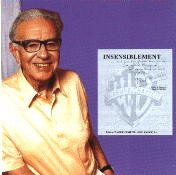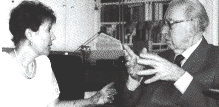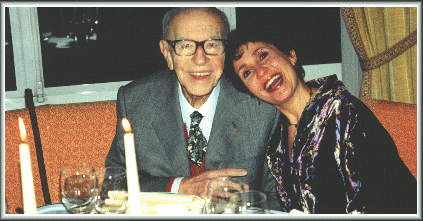Paul Misraki
A magical evening with Paul Misraki
Raquel Bitton
Like many others, even those who knew only his music, but not his name, I was in love with PAUL MISRAKI long before that magical day in 1995 when I met this lovely, captivating man.

His songs are mesmerizing, his range as a composer is immense, his impact on French music is nearly incalculable. He's worked with everyone, he's known everyone, he's influenced everyone. If you know the films of Orson Welles, of Luis Bunuel, of Jean-Luc Godard, of Claude Chabrol, then you know the music of PAUL MISRAKI. If you've listened to Sarah Vaughn, Josephine Baker, to Eartha Kitt, to Yves Montand and French singing legends from the 1930's on, then you've listened to the music of PAUL MISRAKI.
Sometimes it seems as if I've sung his song Insensiblement all my life. And I knew that, as I began to prepare for my new CD, I would have to meet him.

It was one of those days that only happen in Paris , the year was 1996. Spring had repainted in blue all the grey that was lingering on the walls of Paris and in some lover's hearts, I crossed the Pont Neuf, I took in the magnificence of the Seine and the monuments surrounding it, I leaned on a huge doorway in a small street and simply looked up and around, the cobblestone pavement, the neighborhood bistro, the boulangerie across the street and made my way to a court yard where two street artists were singing to windows shut, and sang with them a song I knew and made a couple of Francs from a kind stranger, which I handed over to the accordion player, although I would gladly have kept them as a souvenir.
On my way to PAUL MISRAKI's home, I was wondering, was it possible to feel too much joy, too much anticipation, too much excitement? But there I was in his home, at last, sitting with him at the Piano, listening to him play his songs and talk about his incredible life. How he had found his way to Paris from Constantinople, where he was born in 1908. How, as a young man scarcely out of his teens, he had signed on as an arranger for the French big band Ray Ventura et ses collegiens.
How he had introduced Swing to the French public. How he had lived in Argentina during the occupation. How he had composed the music for more than 160 films.

More than a year later, I was once again in his home, looking through sheet music, spellbound by his stories of working in Buenos Aires, in Hollywood (He was signed to score films for RKO Pictures), in Rio, in Paris. He talked about composing his musical comedy Si eva se hubiese vestido in Argentina, He talked about writing the samba Maria de Bahia in Brazil,and about his symphonic work Rahapsody Brasiliera, and all the magnificent French singers who had recorded his songs through the years.

We went to dinner and, because it was such a lovely, warm evening in Paris, we sat outside. It started to rain and, because the awning over our table did not cover me completely, my back was totally drenched, from my head to my toes, but I certainly was not going to make a fuss, no Parisian waiter, no thunder, no rain would interrupt this magical evening!
